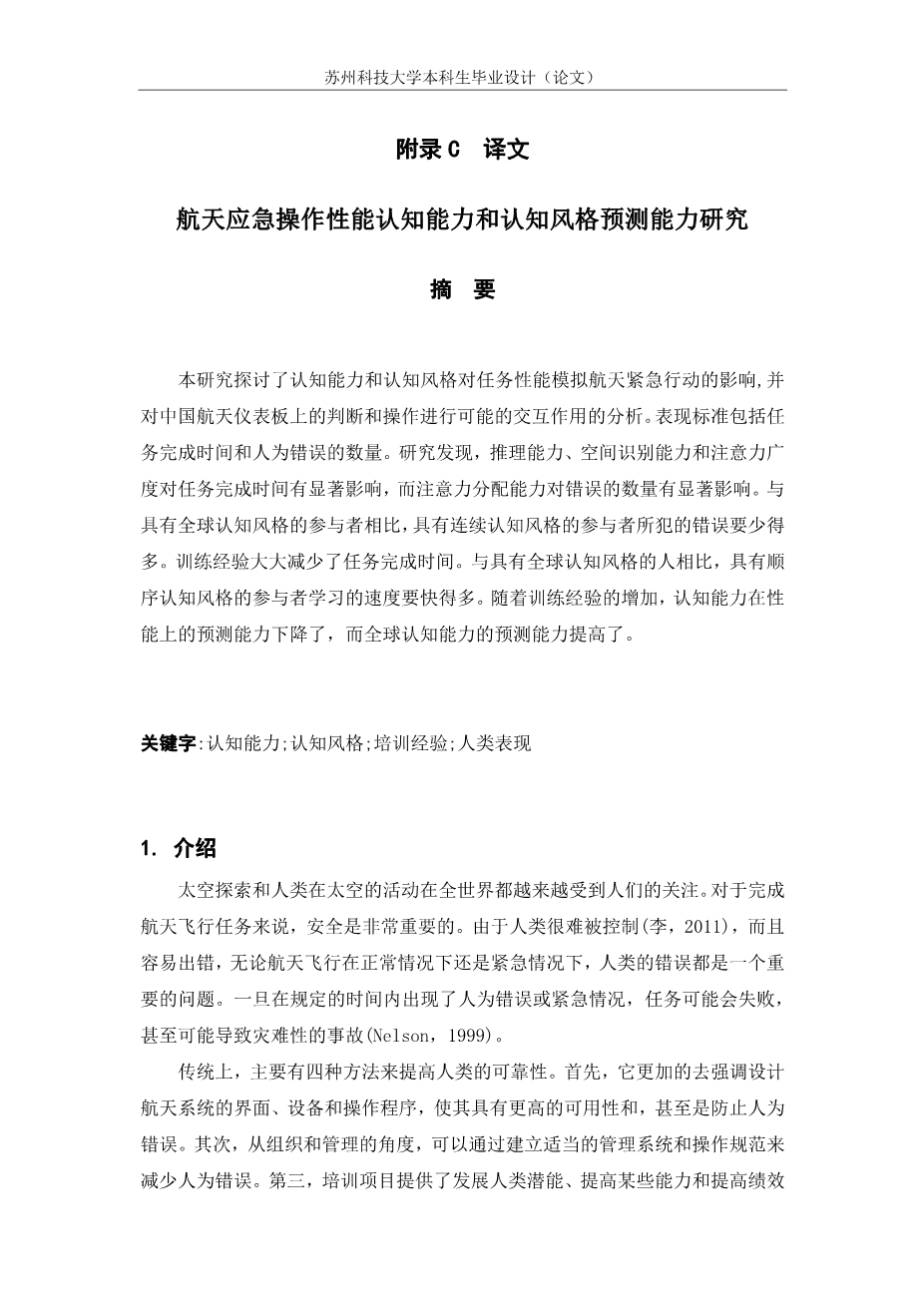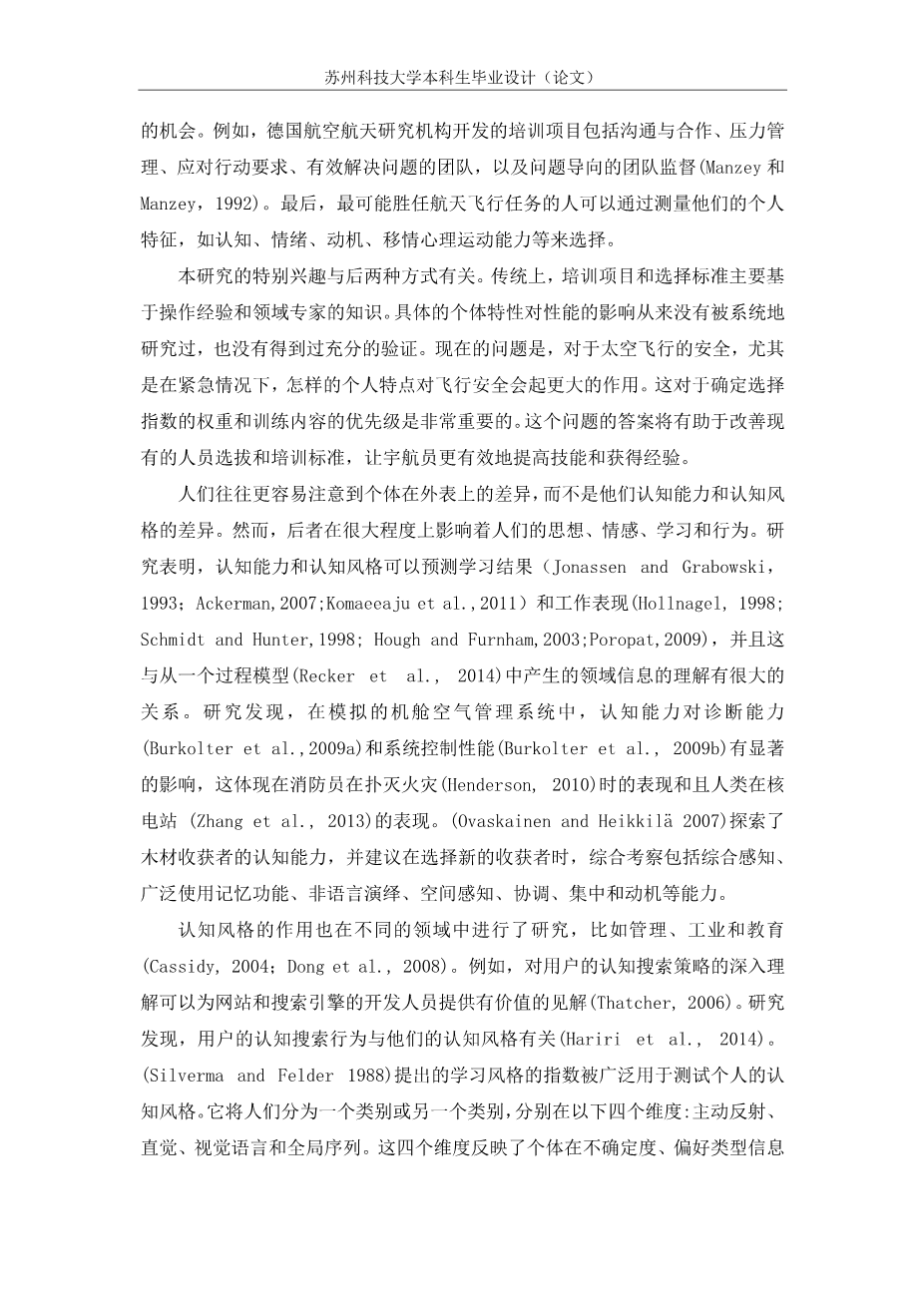Predictive capability of cognitive ability and cognitive style for spaceflight emergency operation performance
Abstract
This study explores the effects of cognitive ability (information seeking, inference, spatial recognition, attention span, and attention allocation) and cognitive style (active-reflective, sensing-intuitive, visual-verbal, and sequential-global) on task performance of simulated spaceflight emergency operations that require judgment and operation on a Chinese spaceflight instrument board and the possible interaction effect with training experience. The performance criteria included task completion time and number of human errors. It was found that inference ability, spatial recognition ability, and attention span had significant effects on task completion time, while attention allocation ability had significant effect on the number of error. The participants with a sequential cognitive style made significantly fewer errors than those with a global cognitive style. Training experience significantly decreased task completion time. The participants with sequential cognitive style learnt faster than those with global cognitive style in the spaceflight instrument operations. With increasing training experience, the predictive capability of cognitive ability on performance decreased, whereas the predictive capability of the sequential-global cognitive style on performance increased
Keywords Cognitive ability;Cognitive styles; Training experience;Human performance
1. Introduction
Spaceflight exploration and human activities in space have been increasingly garnering interest worldwide. Safety is extremely important for completing spaceflight mission successfully. Since humans are difficult to be controlled (Li, 2011) and error-prone, no matter the spaceflight is under normal conditions or emergency situations, human error is a significant issue. Once a human error occurs or an emergency has not been solved within the prescribed time period, mission could fail even cause catastrophic accidents (Nelson, 1999).
Traditionally, there are mainly four ways to improve human reliability. First, it is more emphasized on designing aerospace system interfaces, equipment, and operation procedures to make them with higher usability and more user-friendly for humans, even to prevent human error or be robust to human errors (Seastrom et al., 2004 ; Zhang et al., 2011). Second, from the aspect of organization and administration, human error can be reduced by establishing proper management systems and operation specifications. Third, training programs provide opportunities to develop humansrsquo; potential, improve certain abilities and enhance performance. For example, the training program developed by the German Aerospace Research Establishment covers communication and cooperation, stress management, coping with operational demands, effective problem solving in groups, and problem-oriented team supervision (Manzey and Schiewe, 1992). At last, the persons who are the most likely to be competent for spaceflight mission can be selected by measuring their individual characteristics such as cognition, emotion, motivation, empathy psychomotor ability, etc.
The particular interest of this study relates to the latter two ways. Traditionally, training programs and selection criteria are developed mainly based on operation experience and knowledge of domain experts. The effects of specific individual characteristics on performance has never been studied systematically and verified sufficiently. The question is raised that what individual characteristics are more crucial to spaceflight safety, especially under emergency situations. That is quite important for establishing the weights of selection indices and the priorities of training contents. The answer of this question would be of great help to improve the existing personnel selection and training standard, and for astronauts to build skills and obtain experience more effectively.
People tend to be easier to notice the individual differences in physical appearance rather than the differences in their cognitive ability and cognitive style. Nevertheless, it is the latter largely influencing peoples thinking, feeling, learning and behaviour. Studies have shown that cognitive ability and cognitive style can predict learning outcomes (Jonassen and Grabowski, 1993; Ackerman, 2007 ; Komarraju et al., 2011) and job performance (Hollnagel, 1998; Schmidt and Hunter, 1998; Hough and Furnham, 2003 ; Poropat, 2009), and are significantly related to the comprehension of domain information generated from a process model (Recker et al., 2014). It was found that cognitive ability significantly impacts diagnostic performance (Burkolter et al., 2009a) and system control performance (Burkolter et al., 2009b) in a simulated cabin air management system, firefighters performance in extinguishing fires (Henderson, 2010), and human performance in nuclear power plants (Zhang et al., 2013). Ovaskainen and Heikkilauml; (2007) explored the cognitive abilities of the timber harvester operators and suggested that abilities including comprehensive perception, wide use of memory functions, non-verbal deduction, spatial perception, coordination, concentration and motivation should be evaluated when selecting new harvester operators.
The role of cognitive style has also been conducted in various domains, such as management, industry, and education (Cassidy, 2004 ; Dong et al., 2008). For example, thorough understanding of users cognitive search strategies could provide valuable insights to website and search engine developers (Thatcher, 2006). Users cognitive searching behaviour
剩余内容已隐藏,支付完成后下载完整资料


英语译文共 13 页,剩余内容已隐藏,支付完成后下载完整资料
资料编号:[485604],资料为PDF文档或Word文档,PDF文档可免费转换为Word


